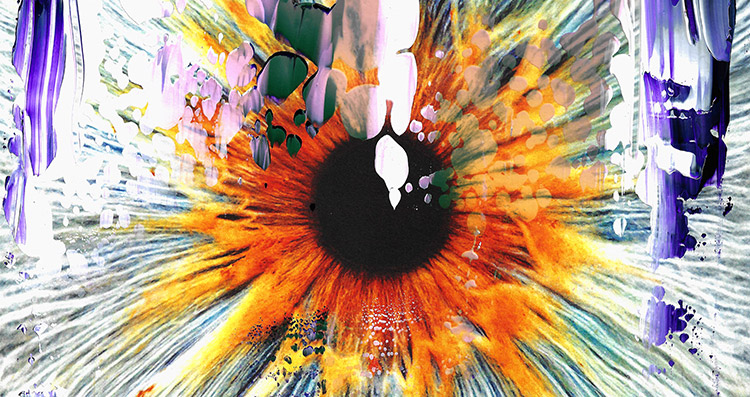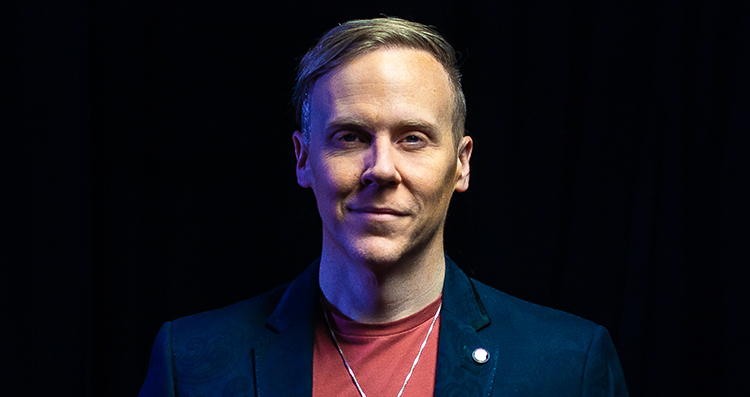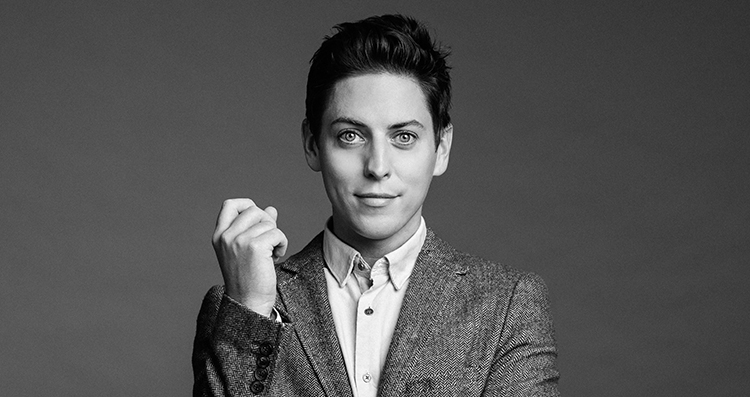Music & Magic
Conceived & programmed by Marco Cera
Scripted by Marco Cera & Nicholas Wallace
Stage direction by Ryan Joyce
Tafelmusik Baroque Orchestra
Directed by Elisa Citterio
Nicholas Wallace magician
Quinten Melo contortionist
Henry Purcell Prelude & Hornpipe from The Fairy Queen
Jean-Féry Rebel Opening of “Chaos,” from Les Eléments
George Frideric Handel Air “What passion cannot music raise and quell,” from Ode for St Cecilia's Day (arranged)
Keiran Campbell, cello soloist | Marco Cera, oboe soloist
Tarquinio Merula Ciaccona
Johann Sebastian Bach Andante, from Sonata in A Minor, BWV 1003
H. Purcell Echo symphony, from The Fairy Queen
Antonio Vivaldi Concerto for violin in E Major, “Spring” from The Four Seasons
Elisa Citterio, violin soloist
G.F. Handel Overture to Flavio
G.F. Handel Overture to Ode for St. Cecilia's Day
Additional music written and arranged by Marco Cera (“Raising Arm” & “If Purcell had a celesta” ©Marco Cera 2021)
Handel St. Cecilia Ode: Text by John Dryden
From Harmony, from heav’nly Harmony,
this Universal Frame began.
When Nature underneath a heap
of jarring Atoms lay,
And could not heave her Head,
The tuneful Voice was heard from high,
Arise! ye more than dead.
Then cold, and hot, and moist, and dry,
In order to their Stations leap,
And Music’s Power obey.
From Harmony, from heav’nly Harmony,
This Universal Frame began:
From Harmony to Harmony
Through all the Compass of the Notes it ran,
The Diapason closing full in Man.
Vivaldi Spring: Writer of sonnet that accompanies the concerto is unknown (possibly Vivaldi himself)
Allegro
Spring has come, and joyfully the birds
welcome it with cheerful song,
and the streams at the breath of zephyrs,
flow swiftly with sweet murmurings.
But now the sky is cloaked in black,
and lightning and thunder announce themselves;
when they are silenced, the little birds
return to fill the air with their sweet song.
Largo
Then on the pleasant flower-strewn meadow,
to the gentle rustle of the leaves and branches,
the goatherd rests, his faithful dog at his side.
Allegro
To the rustic bagpipe’s festive sound,
nymphs and shepherds dance beneath
the fair spring sky in all its glory.
Tafelmusik Baroque Orchestra
Directed by Elisa Citterio
Violin I Elisa Citterio, Geneviève Gilardeau, Michelle Odorico
Violin II Patricia Ahern, Christopher Verrette, Cristina Zacharias
Viola Brandon Chui, Emily Eng
Violoncello Keiran Campbell, Felix Deak
Double bass Pippa Macmillan
Oboe John Abberger, Marco Cera
Bassoon Dominic Teresi
Lute/Guitar Lucas Harris
Harpsichord/Organ/Celesta Charlotte Nediger
Guest Artists
Ryan Joyce, stage director
Ryan Joyce is a magician who wears many top hats. He is an acclaimed entertainer, speaker, and producer who has toured the world with his magic. As a performer, Ryan has appeared in over 5,000 global performances, including Penn & Teller’s Fool Us, Canada’s Got Talent, World Festival of Magic, Celebrity Cruises,and millions of views on YouTube.
For over a decade his theatre show toured to one hundred Canadian towns and cities annually and contributed over two million dollars to Canadian charities. Ryan Joyce is the vice-president of the Canadian Association of Magicians, Canada’s largest organization dedicated to sharing the art of magic, producer of the Ontario Week of Wonder Magic Festival,and co-host of the Magicians Talking Magic Podcast.
Listen to Ryan Joyce's story here
Quinten Melo, contortionist
A contortionist born and raised in Grimsby, Ontario, Quinten Melo started circus at age eleven with the Zacada Circus in Hamilton. At age 14 he moved to Montréal to train at the National Circus School, learning from the world's best coaches and performers. With three years of intense training under his belt, Quinten set off to Germany to begin his first of four contracts for AIDA cruises, a German cruise company. Now at 25, after over a decade away, Quinten has returned home to Niagara to continue performing and teaching Circus and Dance.
Nicholas Wallace, magician
Nicholas Wallace has appeared on America’s Got Talent and on the TV show Penn & Teller: Fool Us, where he successfully fooled the legendary Vegas duo. He has been named Canadian champion of magic by the Canadian Association of Magicians, and is also a recipient of the Allan Slaight Award for Canadian Rising Star.
The year is 1722. A newspaper advertisement circulates the streets of London, announcing the imminent performance of the famous conjurer and showman, Mr. Isaac Fawkes: “He will perform his most surprising tricks by dexterity of hand, with cards, eggs, birds, mice and money, together with the wonderful Posture-Master, who transforms his body into various shapes … Mr Fawkes had the honour to perform for King George, the Prince, and all the Quality of the whole Kingdom, with great applause! Beginning every evening precisely at 5 o’clock at the Hay-Market Theatre.”
In the same year, the new opera Flavio is in rehearsal at the same Haymarket Theatre, set to music by the most excellent musician of the age, George Frideric Handel. Handel brought a new blast of energy, originality and quality to London theatres: the Italian opera. From 1720 to 1728 the operas at the King’s Theatre in London were staged by the Royal Academy of Music, and Handel composed the music for most of them. His reputation among the nobility was stellar.
But what do George Frideric Handel and the mysterious conjurer Isaac Fawkes have in common? Or specifically, what do music and magic have in common? Why was King George drawn to the two art forms? Did he believe that the music of Handel has a component of irresistible magic and illusion?
These are the questions behind the show that you are about to enjoy — an exploration of the mysteries and similarities of music and magic, two art forms that are rarely compared and performed together.
There are countless common elements between the tools used by a composer and a magician. Starting from the suits in a deck of cards, which mirror the musical chromatic scale; the manual dexterity required to master both musical instruments and sleight of hand, the discipline that is fundamental to the art of creating illusions; the perfectionism and many hours of practising required to make the most difficult sequences appear effortless; and the ability to create authentic moments of awe and wonder that arouse the senses.
Deceiving the eye is a tool that was well used in baroque visual art and architecture. In the same way that modern illusionists manipulate our senses, baroque architects experimented with curves, light, and proportions to create clever optical illusions. Sculptors like Gian Lorenzo Bernini perfectly rendered the human form in solid marble, which deceptively appears as soft and malleable as flesh, drapery, or fine cloth. Painters like Rembrandt, Vermeer, and Caravaggio relied on chiaroscuro, foreshortening, and other optical techniques that brought illusionism to new heights during the 17th century.
Like these great artists, baroque composers, including Bach and Telemann, created auditory illusions, such as the phenomenon of melodic fission, where a single melody is perceived by the ear as two melodic lines. Baroque composers such as Purcell also created the opposite effect, achieving an echo by suddenly changing the volume, or, even more sneakily, secretly employing hidden musicians backstage.
And what about the magic of Antonio Vivaldi’s programmatic music? Listening to “Spring,” Vivaldi’s famous violin concerto, is like stepping into the natural world, capturing your imagination and drawing you into the sights, sounds, and smells of the season. Flowing creeks, singing birds, barking dogs, shepherds playing the zampogna (bagpipe), and sudden thundering storms are all expressed so vividly. But they are only illusions: teasing our senses, tricking our mind’s ear. Isn’t Vivaldi’s ability to evoke something extra-musical proof that Music is indeed Magic?
I have been a fan of magic since I was a young child, and I always thought that being a musician is very similar to being a magician. When I attend a magic show or a concert as a spectator, I expect to be deceived — and I enjoy being fooled. I accept the fact that the artist, the composer, and the magician are tricking me, in a sense lying to me, but with the noble intention of creating something sublime.
If you like magic as I do, sit back, relax and let us give you a moment of joy. Are you ready to be fooled? You may experience that the impossible, for just a moment, can be real.
Note from Nicholas Wallace, magician
Music is a mystery to me. The way composers sometimes describe writing a song, not by sitting down with paper and pencil, but by somehow catching it out of the ether like a mystic fisherman. Like it was something that was there all along that no one else saw. The way a melody can instantly transport you to a time and place in your life, can move you to tears, or raise goosebumps on your flesh. It’s all magic.
I understand that to most people, the performance of magic is a mystery (assuming it is done well), so I guess it only makes sense to try and combine the two. I began taking music lessons when I was five years old, and after many years gave it up to pursue my interest in magic. In many ways this project feels like I have come full circle. This program was a joy to put together. I hope you enjoy it.
Note from Ryan Joyce, stage director
Musicians and magicians share similar dedications. What makes the art of magic unique is that mastery is the biggest secret. A talented magician like Nicholas Wallace works his entire life on incredibly difficult skills and techniques that the audience never sees. It’s our job behind the camera to authentically capture and share these experiences with the viewers. Exactly the same as if they were standing with us in the room.
Throughout the concert, the audience will experience several styles of magical performance, including mindreading, close-up magic, and demonstrations with the entire orchestra. As a result of the changing pandemic requirements, we filmed several segments on location at Nick’s home. He has an incredible barn that made a perfect backdrop for his unique style and magic.
As the audience enjoys watching Music & Magic, they can rest assured no camera tricks were used in filming and production and all Nick’s astonishing deceptions rely entirely on his talent and skill.
Thank You to our Generous Donors
Tafelmusik is deeply grateful to our generous donors who have continued to support us through this challenging time. Your support has inspired us to remain strong and to deliver joy to our community through our music, and will enable us to persevere until we can once again perform live for you, our cherished patrons. Thank you for believing in Tafelmusik and in the power and beauty of music.
If you would like to make a gift, please click here or contact us at donations@tafelmusik.org.
2021/22 Season Presenting Sponsor
Thank you to our government sponsors









